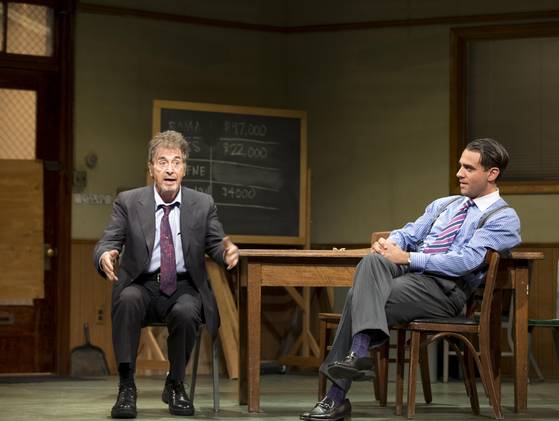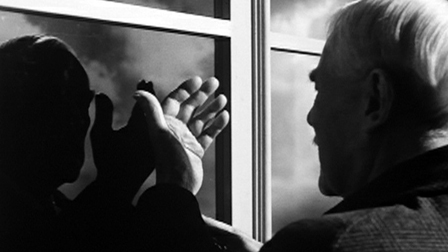The Wall Street Journal has given me an extra column today in which to report on the Broadway revival of Glengarry Glen Ross, which is a stunner. Here’s an excerpt.
* * *
David Mamet has two shows running on Broadway this week. One of them, “The Anarchist,” is a freshly minted flop that will close on Sunday. The other, “Glengarry Glen Ross,” is a hugely successful revival of one of Mr. Mamet’s most popular plays. The situation recalls his own zero-sum philosophy: “Economic life in America is a lottery. Everyone’s got an equal chance, but only one guy is going to get to the top….So one can only succeed at the cost of the failure of another.” The catch is that Mr. Mamet is now playing the parts of both guys. And unlike “The Anarchist,” a wan, stillborn debate about terrorism that stubbornly insists on its meaning in every line, “Glengarry Glen Ross” is one of the finest American plays of the 20th century, a modern classic which–like all the best art–makes its points without seeming to make them.
 You might well wonder whether a play that’s already been mounted twice on Broadway, in 1984 and 2005, is due for another revival. But once you’ve seen this version, performed with stupendous dynamism by a cast led by Al Pacino and Bobby Cannavale, you’ll wonder why you wondered….
You might well wonder whether a play that’s already been mounted twice on Broadway, in 1984 and 2005, is due for another revival. But once you’ve seen this version, performed with stupendous dynamism by a cast led by Al Pacino and Bobby Cannavale, you’ll wonder why you wondered….
If you know “Glengarry,” you’ll most likely have guessed that Messrs. Cannavale and Pacino are playing Ricky Roma and Shelly “The Machine” Levene, a pair of ravenously hungry Chicago real-estate salesmen who are respectively on the way up and on the way down. “A man’s his job,” Ricky assures us with adamantine certainty. In the all-male world of “Glengarry Glen Ross,” a man’s job is also the taproot of his masculinity, and if he can’t close the deal, he’s no man at all. Ricky accepts that premise as confidently as he rejects the “middle-class morality” that he dismisses with annihilating contempt: “I do those things which seem correct to me today….Bad people go to hell? I don’t think so. If you think that, act that way. A hell exists on earth? Yes. I won’t live in it.” Except that he does….
Mr. Pacino, who was cast as Ricky in the 1992 film version of “Glengarry,” has switched to Shelly this time around, and that’s the key to his performance: He plays Shelly as if he were Ricky gone to seed, pretending to a success that is no longer his. No sooner are his desperate lies brought to light than he dies inside, seeming to shrink by a foot before your horrified eyes. As for Mr. Cannavale, he couldn’t be more different from Liev Schreiber, who played Ricky on Broadway in 2005. While Mr. Schreiber was chilly and sleek, Mr. Cannavale brings a hypnotically vulgar charm to the part. Few stage actors are gifted enough to go head to head with Mr. Pacino and remain standing, but Mr. Cannavale has a double dose of what it takes. To see them spitting lines at one another like snakes on a bed of hot coals is the stuff that sold-out houses are made of….
* * *
Read the whole thing here.
An excerpt from the 1992 film version of Glengarry Glen Ross, with Al Pacino as Ricky Roma:
Archives for December 11, 2012
TT: Lookback
 From 2003:
From 2003:
When I was young, Wild Strawberries struck me as exactly what old age must be like. (Had it been a novel, I would have scribbled neatly in the margin of the last page, “This is true.”) Now that I’m middle-aged–and eight years older than Bergman was when he made it–I know better. It’s far too benign, albeit gorgeously so. It reminds me of what an old music critic once said to me about Der Rosenkavalier: “It’s by a young man pretending to be an old man remembering his youth.”…
Read the whole thing here.
TT: Almanac
“When we say ‘damn,’ it relieves us because it is a strong word, and yet means nothing. We do not intend the person or thing or event that we damn to be burnt in hellfire–far from it. But the faint aroma of brimstone that hangs forever about the word is savory in wrathful nostrils.”
H.W. Fowler, A Dictionary of Modern English Usage (courtesy of Richard Zuelch)
